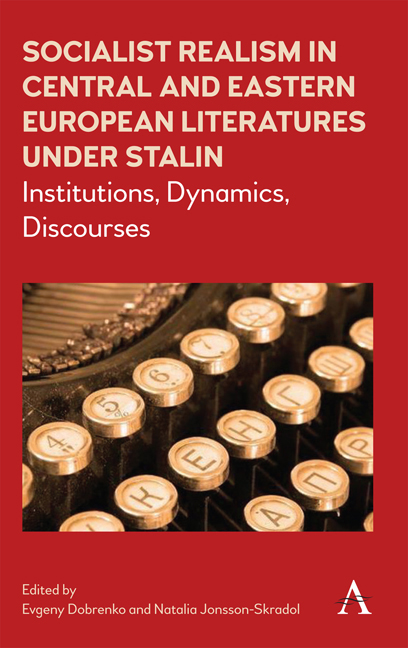 Socialist Realism in Central and Eastern European Literatures under Stalin
Socialist Realism in Central and Eastern European Literatures under Stalin Book contents
- Frontmatter
- Contents
- Acknowledgements
- Introduction
- Part 1 Institutions
- 1 How Socialist Realism Was Exported to Eastern European Countries and How They Got Rid of It
- 2 Literary Monopolists and the Forging of the Post–World War II People's Republic of Letters
- 3 Once Dr Faul Has Left: The Agony of Socialist Realism in Poland, 1955–56
- 4 From Literature Censored by Poets to Literature Censored by the Party: Censorship in the Czech Literary Culture of 1945–55
- 5 The Demise of ‘Socialist Realism for Export’ in 1947: VOKS Receives John Steinbeck and Robert Capa
- 6 The Soviet Factor and the Institutionalization of Bulgarian Literature after World War II
- 7 Cultural Renewal in Eastern Germany – Mission Impossible for Soviet Cultural Officers and German Anti-Fascists?
- Part 2 Dynamics
- Part 3 Discourses
- Conclusion
- List of Contributors
- Index
4 - From Literature Censored by Poets to Literature Censored by the Party: Censorship in the Czech Literary Culture of 1945–55
from Part 1 - Institutions
Published online by Cambridge University Press: 10 May 2018
- Frontmatter
- Contents
- Acknowledgements
- Introduction
- Part 1 Institutions
- 1 How Socialist Realism Was Exported to Eastern European Countries and How They Got Rid of It
- 2 Literary Monopolists and the Forging of the Post–World War II People's Republic of Letters
- 3 Once Dr Faul Has Left: The Agony of Socialist Realism in Poland, 1955–56
- 4 From Literature Censored by Poets to Literature Censored by the Party: Censorship in the Czech Literary Culture of 1945–55
- 5 The Demise of ‘Socialist Realism for Export’ in 1947: VOKS Receives John Steinbeck and Robert Capa
- 6 The Soviet Factor and the Institutionalization of Bulgarian Literature after World War II
- 7 Cultural Renewal in Eastern Germany – Mission Impossible for Soviet Cultural Officers and German Anti-Fascists?
- Part 2 Dynamics
- Part 3 Discourses
- Conclusion
- List of Contributors
- Index
Summary
The Clash on Stalinova Třída: Stalinist Censorship from the Viewpoint of Discontinuity
On 22 October 1948 members of what was called the Interim Board of Editors (Prozatímní ediční rada) convened at the Ministry of Information on Stalinova třída (Stalin Avenue) in Prague. This was an advisory body to the Ministry of Information of Czechoslovakia, which for three years, since autumn 1945, had been assessing Czech (not Slovak, for there were different print regulations in place in the eastern part of Czechoslovakia) publishers’ plans and recommending to the ministry whether or not to allow the publication of particular titles. It would also propose alterations to manuscripts on the basis of internal reviews, judging the quality of translations and establishing the extent of print runs and the graphic and artistic presentation of books. Eight months previously, in February 1948, the communist takeover of Czechoslovakia had occurred, which left its mark on the make- up and status of the Interim Board of Editors. The most important change had taken place just a month before this meeting, when the chairman of what was known as the Review Board at the Secretariat of the Czechoslovak Communist Party's Central Committee (Lektorská komise ÚV KSČ) and director of the Party's ‘Kultprop’ Press Department, Pavel Reiman, stated that the Interim Board of Editors was not performing adequate checks on the ‘ideological aspect’ of newly published books. He agreed to join the Board of Editors himself, together with Information Minister Václav Kopecký, and immediately began to alter the practices that had been the target of his criticism.
At that particular time the Review Board was the primary intellectual and ideological body dealing with literature and the book market on behalf of the Communist Party. The Czech– German journalist, literary critic and historian Pavel Reiman was one of the first Party members and also was the author of the first history of the Czech Communist Party (written just ten years after the Party was established in 1921). In the late 1920s and early 1930s, while working for the Comintern in Moscow, Reiman had supported the Stalinization of the Party, and he spent World War II in British exile.
- Type
- Chapter
- Information
- Socialist Realism in Central and Eastern European Literatures under StalinInstitutions, Dynamics, Discourses, pp. 61 - 70Publisher: Anthem PressPrint publication year: 2018


